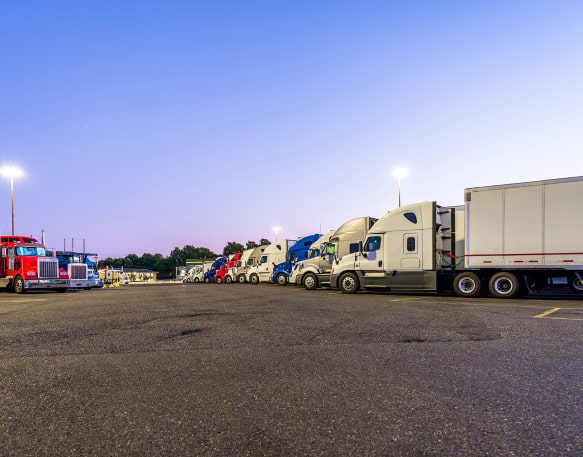In the trucking industry, a reefer is a type of trailer and a deadhead is something to avoid at all costs. Transportation professionals have their own language, and if you’re new to the industry, you may feel a little lost. That why we’ve put together this list words that are commonly used in the trucking industry.
Accessorial charge – A charge for supplemental services that go above and beyond what’s considered normal. Carriers will often charge “accessorials” for time being detained by a shipper, having to load or unload freight, securing odd-sized freight to a flatbed trailer, etc.
AOBRD – Automatic On-Board Recording Device, sometimes called EOBR, for Electronic On-Board Recorder. An AOBRD is a hardware device that connects to the vehicle’s electronic control module and captures information about the movement of the truck. Beginning on December 16, 2019, AOBRDs must be replaced with ELDs (see below) in order to properly log drivers’ hours of service and duty status, in compliance with Federal law.
ATA – American Trucking Associations. This industry trade association, headquartered in Virginia, is the umbrella organization for 50 affiliated state trucking associations.
Authority – In order to operate legally, both for-hire carriers and freight brokers must obtain operating authority from the U.S. Department of Transportation (DOT).
Backhaul – The return trip, which usually pays a lower rate than the headhaul.
Benchmark – A standard by which others may be measured. Companies often use DAT’s rates as a benchmark to compare with their own.
Bill of lading – A legal document that lists the goods being shipped and states the terms of their transport.
Bobtail – A heavy-duty truck without a trailer attached.
Broker – An intermediary who arranges transportation services. Shippers often hire freight brokers to find carriers to transport their goods.
Capacity – In the trucking industry, this buzzword refers to the availability of trucks that can be hired to haul freight. Example: Capacity is tight (scarce) during spring produce harvests.
Carrier – A trucking company or individual owner-operator that transports goods. (Also see “For-hire carrier.”)
Contract rate – The agreed upon rate per mile for an extended term, such as a 1-year contract. (Also see “spot market rate.”)
CDL – Commercial Driver’s License. A CDL is required to drive a truck or bus weighing over 26,000 pounds gross vehicle weight.
DAT – Short for the company name DAT Solutions. The company was founded in 1978 as Dial-A-Truck.
Deadhead – Driving with an empty trailer. Since most trucks are paid by the mile only when they’re loaded, deadhead often means moving the truck for no pay.
Drop and hook – When a driver leaves a trailer at a loading dock and hooks up to a different trailer for the return trip. This eliminates the need for the driver to wait for “live” loading or unloading.
Dry van – See “van.”
DOT – Department of Transportation. This Federal agency regulates interstate trucking in the United States.
ELD – Electronic Logging Device. An on-board device that records information about the movement of a truck, including speed and time in service, as well as the driver’s hours of service and duty status. As of December 2017, ELDs are required on all trucks (with some exceptions), replacing paper logs kept by drivers. Trucks that were previously equipped with AOBRDs were permitted to continue using those devices until December 16, 2019, when they must switch to ELDs, as well.
EOBR – Electronic On Board Recorder. (See AOBRD.)
Expedite freight – Time-sensitive freight that must be delivered at a pre-set delivery time.
Express – DAT One Express™ is a load board operated by DAT Solutions. It is used primarily by small and medium-sized freight brokers.
Factoring – In the trucking industry, factoring is when a carrier receives payment from a third-party financial company before delivering a load and waiting for payment, thereby improving cash flow. The freight factoring company retains a fee, typically based on a percentage of what the carrier would have earned. Freight brokers may also rely on factoring to improve cash flow.
Flatbed – An open-deck trailer consisting of a platform for transporting large or odd-shaped freight that must be loaded or unloaded from the top or the side, as well as freight that cannot fit inside a standard van trailer.
For-hire carrier – A trucking company that transports freight for others.
FMCSA – Federal Motor Carrier Safety Administration, an agency within the U.S. Department of Transportation that enforces commercial motor vehicle safety regulations.
Freight broker – A person who arranges transportation and functions as an intermediary between a shipper and a carrier. Sometimes referred to as a “property broker.”
Freight matching – DAT Solutions’ core product, a software service that matches available freight with available trucks. Also called a load board.
FSC – Fuel surcharge. See entry below.
Fuel surcharge – A charge that covers the cost of fuel. Freight rates quoted by DAT generally break down the total rate into the average linehaul rate, plus the more-volatile fuel surcharge.
Headhaul – The higher paying segment of a round trip. Also referred to as a linehaul. The lower-paying return trip is called a backhaul.
Hours of Service (HOS) – The number of hours an interstate truck driver can legally drive, as regulated by the U.S. Department of Transportation.
Hot shot – Expedited freight normally limited to a gross weight of 36,000 pounds. Can also refer to the truck hauling the freight, which can be as small as a one-ton pickup hauling a flatbed trailer.
IFTA – International Fuel Tax Agreement. An agreement between the lower 48 United States and Canadian provinces, in which carriers report fuel tax paid at the pump on a quarterly basis, and the money is redistributed to the states and provinces where the fuel was used.
Intermediary – In trucking, this term usually refers to a freight broker or third-party logistics (3PL) company that manages transportation on behalf of a shipper.
Intermodal – Freight that requires more than one mode of transportation for the same shipment. Typical modes include air, rail, sea, and truck.
Lane – A particular route, defined as an origin and destination pair. For example, the route from Chicago to Dallas is a lane, and Dallas to Chicago is a distinct lane.
Linehaul – The rate or price associated with a specific lane, exclusive of the fuel surcharge, accessorials, and other fees. The linehaul rate may be quoted per mile or per trip.
Link Logistics – TransCore Link Logistics operates a load board and information services in Canada, much like DAT Solutions does in the United States. Both TransCore Link Logistics and DAT Solutions are subsidiaries of Roper Technologies.
Load – A single freight shipment.
Load board – A service that matches shippers and freight brokers with carriers (trucking companies) willing to transport the freight. DAT (originally called Dial-A-Truck) created the first electronic load board in 1978 at Jubitz Truck Stop in Portland, Oregon, replacing the previous system of index cards pinned to bulletin boards.
Load-to-truck-ratio – The number of trucks available for hire in a specific location versus the number of available loads at that location. A high load-to-truck ratio in a certain city, state, or region means that a carrier is more likely to find freight there.
LTL – Less Than Truckload. A shipment whose weight and size characteristics allow it to be consolidated with other shipments in a single truckload, or to be shipped as is.
MembersEdge – which was once the preferred load board for owner-operators, is now integrated into DAT One. This transition brings enhanced features, a more streamlined user experience, and continues to offer the trusted load board services under the new DAT One platform name.
MyDAT® Trucker – DAT’s mobile app for drivers. MyDAT operates on iPhone and Android smartphones.
Onboarding – The process in which a freight broker “brings on” a carrier he’s never worked with before. The carrier must sign the broker’s agreements, supply insurance agent details, W8/W9 information, etc.
Owner-operator – A subset of the carrier market, describing an individual who both owns the truck and drives it on a regular basis. Owner-operators may lease onto a larger carrier and operate under that carrier’s authority.
DAT One (Formerly DAT Power) – DAT One is DAT’s most comprehensive load board, used by medium- to large-sized brokers and carriers.
Power only – If a shipper provides the trailer, he may request only a power unit (truck or tractor) to pull the trailer.
Power unit – The tractor portion of a tractor-trailer, which contains the engine.
Property broker – See “freight broker.”
Rate Per Mile (RPM) – The most common form of pricing used in the spot market. The total price is calculated as follows: Rate per mile (including fuel surcharge) x number of miles = total price.
Reefer – A refrigerated trailer used to move freight that requires a temperature-controlled environment.
RFP – Request for Proposal.
RFQ – Request for Quote.
Roper Technologies – The parent company of DAT Solutions. Roper Technologies is a diversified technology company and constituent of the S&P 500, Fortune 1000, and Russell 1000.
Shipper – The sender (such as a manufacturer, grower, retailer or distributor) who hires a carrier to transport goods.
Spot market – Spot market freight — sometimes called exception freight — is not under a long-term contract between a shipper and a carrier. Spot market freight rates are typically determined by short-term supply and demand conditions.
TCA – Truckload Carriers Association, a national association for truckload carriers, based in Alexandria, Virginia.
TIA – Transportation Intermediaries Association, an industry association for freight brokers and third-party logistics professionals (3PLs), based in Alexandria, Virginia.
TMS – Transportation Management Software, a type of computer software designed specifically for transportation professionals, helping them manage almost every aspect of their business.
Tractor – A truck that pulls a trailer.
Trailer – The non-motorized unit pulled by a tractor (truck). Common trailer types include vans, flatbeds and refrigerated units (reefers).
TriHaul™ – A three-legged route that pays better or offers better use of the truck and the driver’s hours, compared to a straight roundtrip between point A and point B. DAT load boards automatically suggest TriHaul routes.
Truck – An 18-wheeler with detachable trailer.
DAT One (Formerly TruckersEdge®) – A load board operated by DAT Solutions, used primarily by owner-operators and small trucking companies.
Truckload – A shipment that fills an entire trailer, either by reaching its maximum weight or volume. Also see “LTL” or less-than-truckload shipment.
Van – The most common trailer type, a van is an enclosed rectangular box that holds freight. The most common type of van is 53 feet long. Also called a “dry van.”




